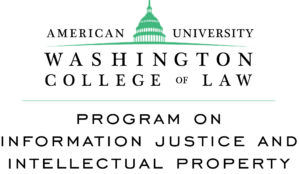 Sean Michael Flynn and Michael Palmedo
Sean Michael Flynn and Michael Palmedo
Comments to U.S. Trade Representative, re: NAFTA Negotiation
The AU Program on Information Justice and Intellectual Property has been working over several years on empirical research pertaining to the impact of balanced copyright systems on trade and economic development. One key element of an adequately balanced copyright system is having sufficiently “open” limitations and exceptions for the digital environment. We refer to “open” limitations and exceptions for the digital environment as those that are open to the use of any kind of work, by any kind of user and for any purpose, as long as the use does not unreasonably prejudice the legitimate interests of the author. Such openness is the hallmark of the U.S. fair use clause. These “open” aspects are crucial because the digital environment creates new opportunities to use different kinds of works, by different users and for different purposes than were envisioned in most copyright statutes. An open statute is a flexible one – and flexibility is needed to accommodate and encourage innovation in the digital environment.
Our research indicates:
- Greater openness is associated with better outcomes for foreign affiliates of U.S. multinational enterprises in the Scientific, Technical & Professional Services industries
- Commerce department data provides no evidence that affiliates of U.S. firms classified under the NAICS 51 heading – including publishing, music, and movies – perform more poorly in countries with more open copyright user rights
- S. firms in the computer service, information service, and contract R&D industries export more services to countries with greater openness
- Imports of books from the U.S. are not negatively affected by the openness of copyright user rights in the importing countries
- Greater openness is not associated with lower net income for the local firms in movie or music industries in the countries that we have studied, though there is weak evidence of a negative relationship between openness and print publishing
Click here for our full comment to USTR.
Click here for the docket with other comments on regulations.gov.




